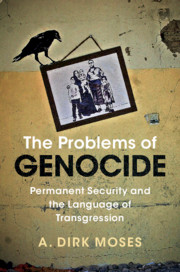Book contents
- The Problems of Genocide
- Human Rights in History
- The Problems of Genocide
- Copyright page
- Contents
- Preface
- Introduction
- Part I The Language of Transgression
- Part II Permanent Security
- Part III The Language of Transgression, Permanent Security, and Holocaust Memory
- 10 Lemkin, Arendt, Vietnam, and Liberal Permanent Security
- 11 Genocide Studies and the Repression of the Political
- 12 Holocaust Memory, Exemplary Victims, and Permanent Security Today
- Index
10 - Lemkin, Arendt, Vietnam, and Liberal Permanent Security
from Part III - The Language of Transgression, Permanent Security, and Holocaust Memory
Published online by Cambridge University Press: 07 January 2021
- The Problems of Genocide
- Human Rights in History
- The Problems of Genocide
- Copyright page
- Contents
- Preface
- Introduction
- Part I The Language of Transgression
- Part II Permanent Security
- Part III The Language of Transgression, Permanent Security, and Holocaust Memory
- 10 Lemkin, Arendt, Vietnam, and Liberal Permanent Security
- 11 Genocide Studies and the Repression of the Political
- 12 Holocaust Memory, Exemplary Victims, and Permanent Security Today
- Index
Summary
The instalment of genocide as the “crime of crimes” marked a turning point in the centuries-old language of transgression: now only mass criminality motivated by race-hatred that resembled its archetype, the Holocaust, shocked the “conscience of mankind.” This depoliticization had momentous consequences for the visibility of permanent security. Now only illiberal permanent security – embodied by the Axis powers that disgraced themselves in the Second World War – counted as seriously criminal. Practices of liberal permanent security were not so shocking, notwithstanding the postwar peace movement’s attempt to link Auschwitz and Hiroshima. The most dramatic decades are mid-1960s to the early 1980s when scholars and activists who excoriated the US bombing and counterinsurgency strategy in Vietnam, and its nuclear weapons program. At issue were the notions of “national security” and “military necessity,” the watchwords of the juggernaut they called the US “national security state.”
Keywords
- Type
- Chapter
- Information
- The Problems of GenocidePermanent Security and the Language of Transgression, pp. 395 - 440Publisher: Cambridge University PressPrint publication year: 2021

